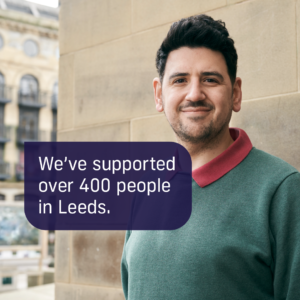Gambling charity and Danny Care highlight free local support to Leeds community ahead of National Stress Awareness Month
Topics

Ahead of ‘National Stress Awareness Month’, professional rugby player Danny Care and the charity GamCare have teamed up to highlight the free support available in Leeds for anyone struggling with gambling.
The charity, under its local partnership with the Leeds Community Gambling Service, has helped over 400 people tackle the emotional and physical side-effects associated with gambling in the area since 2019.
GamCare operates the National Gambling Helpline – a 24 hours a day, seven days a week helpline that people can call for free practical advice, information and support around gambling. The charity helped establish the Leeds Community Gambling Service in 2019 as a specialised service to reduce gambling-related harms in the area, providing confidential treatment sessions for anyone, either online or in-person.
According to data from GamCare:
- More men than women come forward in the Leeds area to seek support for their gambling. Men make up the more than half (57%) of service-users whereas women make up more than one-third (39%).*
- Over a third (35%) of people seeking help across the city are aged 26 to 35, underlining how young adults can be susceptible to gambling-related harms within the Leeds area.
- The most popular form of gambling across Leeds was online casino slots (32%) followed by online gambling for sports events (11%).
Bryn Mostyn, Team Leader from GamCare commented: “Every day we see how gambling-related issues, such as significant debt or relationship difficulties, can lead to high levels of stress. It’s not only important for people to recognise the signs that their gambling could be going too far, but also to know that there is free, local support on hand to support anyone through their recovery. We’re here, we’re local and we can help, particularly as we approach ‘National Stress Awareness Month’.

Bryn added: “Being in a supervisory position, I am motivated to ensure my team at the Leeds Community Gambling Service are providing the best possible support for Leeds residents who may be experiencing gambling harms, as either the gambler themselves or a loved one of a gambler. It’s so crucial that people in Leeds know how and where they can find help should they be struggling with gambling-related issues.
Danny Care, a Leeds-born rugby union player commented:
“With gambling being prevalent in the sporting industry, I am pleased to be backing this campaign to raise awareness of GamCare and the work they do to help anyone struggling with gambling in Leeds. It is important people know where they can turn for help, should they need it.”
Jack, a Leeds based Training and Engagement Lead, added: “It is extremely important to educate people across Leeds about gambling and the impact it can have on them and their loved ones. It is our core aim at Leeds Community Gambling Service to make sure that the community are aware of gambling harm, the support we offer and know when and how people can access support if they need it.”
Recent research commissioned by GamCare revealed that over six million Brits know someone with a gambling issue. Furthermore, a quarter of Brits (25%) admit to regretting a bet they have placed.**
Five signs to look out for if you’re concerned about someone else’s gambling:
- Withdrawn – Not wanting to join in or losing interest in usual activities or hobbies like going out with friends or spending time with family can be one of the early warning signs that gambling could be harmful. Wanting to stay at home more frequently, needing to check their phone constantly to check the latest results as so much is riding on a bet.
- Changing mood – There could be noticeable changes to their mood and behaviour, including looking worried, agitated or upset for no apparent reason.
- Sleeping problems – If someone is chasing losses and losing money they might not be sleeping. Anxiety or constant worrying can lead to people being up all hours. Continuing to gamble on their phone during the night could lead to sleep patterns being affected.
- Financial signs – Has money gone missing from bank accounts, or are they regularly short of money on a regular basis and are having to borrow money? There may also be more pressure to get loans out, chasing losses now not just to generate income.
- Lying – Are you noticing that this person is lying about what they’re doing with their time? The biggest risk is the expectation they will feel from others to provide and if they are hiding the gambling they will feel very vulnerable at being found out and very low that they have let people down.
For more on Leeds services, visit gamcare.org.uk/leeds
This is based on a survey of 468 clients within the period of 1st October 2019 to 31st January 2022, from across the Leeds area.
*The remaining 4% of service users’ gender was not known.
**This is based off YouGov research conducted amongst 1000+ UK adults between 3-6th December 2021
Topics




